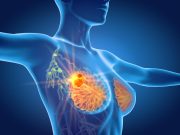Tag: Cancer: Breast
Individuals With Advanced Breast Cancer at Diagnosis More Likely to Have CVD
For female patients aged at least 66 years, odds of prevalent CVD up with locally advanced and metastatic disease
Age Impacts Surgical Outcomes for Breast Reconstruction
Significant association seen for older age with increased risk for developing mastectomy skin flap/nipple necrosis, infection, seroma
Disparities Seen in Biennial Mammography Screening for Women in in Their 40s
Biennial screening rates lower among non-Hispanic women with other race, lesbian and bisexual women, rural residents
Cannabidiol Safe, May Lower Anxiety in Advanced Breast Cancer
CBD did not meet primary end point comparing preingestion to postingestion anxiety, but resulted in lower anxiety levels
San Antonio Breast Cancer Symposium, Dec. 10 to 13
Breast Cancer Risk Increased With Weight Gain After Age 35 Years
Risk higher for women who gained more than 10 kg weight after 35 years of age versus those with stable weight
SABCS: Chest Wall Irradiation Does Not Impact Survival in Breast Cancer
CWI has no impact on overall survival at 10 years among patients with intermediate-risk breast cancer
SABCS: Risk-Reducing Surgery Improves Outcomes in Young Breast Cancer Patients With BRCA Mutations
Findings show survival benefits for both risk-reducing mastectomy and salpingo-oophorectomy
SABCS: Omission of Axillary Staging Noninferior for Node-Negative Breast Cancer
Omission noninferior to sentinel-lymph-node biopsy for clinically node-negative early-stage invasive breast cancer
SABCS: Active Monitoring Noninferior to Guideline Care for Ductal Carcinoma in Situ
Two-year cumulative rate of invasive ipsilateral breast cancer 5.9 and 4.2 percent for guideline-concordant care, active monitoring














